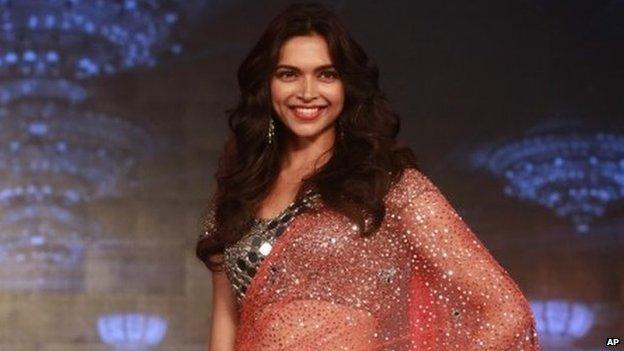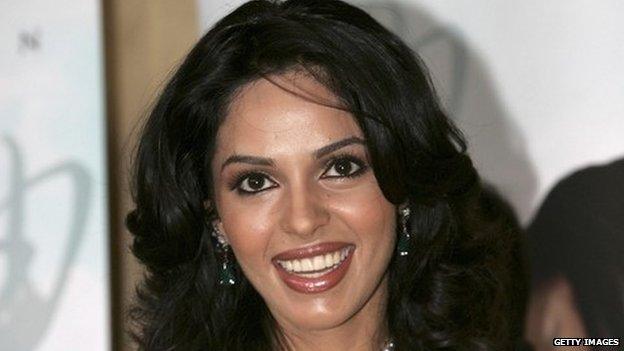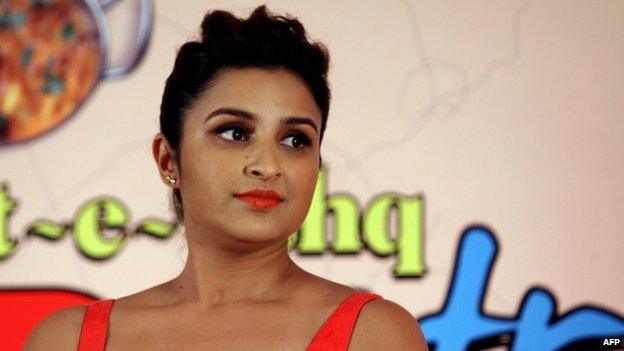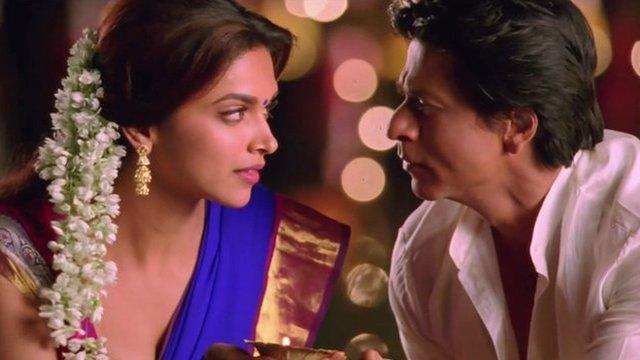Deepika Padukone: Why Bollywood stars are speaking out on sexism
- Published

Deepika Padukone has been praised for speaking out against the "sexist" report
India's leading newspaper The Times of India has been fiercely criticised after it published a photo and tweet about actress Deepika Padukone's cleavage. But Padukone is not the first Bollywood star to clash with the media recently.
"OMG: Deepika Padukone's cleavage show," the paper tweeted alongside a photo of her from an event last year.
Thousands joined Bollywood celebrities in condemning the newspaper and praising Padukone for speaking out against the tweet.
Her indignant reply - "YES! I am a Woman. I have breasts AND a cleavage! You got a problem!!??" - was re-tweeted more than 7,000 times.
#IStandWithDeepikaPadukone has been India's top Twitter trend for hours and the actress is being lauded for taking on the Times of India.
But she is just the latest Bollywood actress to clash with the media.
Last October, India (and indeed the world) was transfixed by a video of Mallika Sherawat's heated exchange with a female reporter, external at a press conference where the actress refused to retract her statement that "Indian society is regressive for women".
Sherawat was in India to launch her show The Bachelorette India when the reporter questioned whether Sherawat was right to criticise India in an interview with US magazine Vanity Fair by calling "India regressive and depressing".
An angry Sherawat took on the reporter, saying she was "not going to lie" or "join this hypocrisy that is there in our society".
"With female foeticide, infanticide happening on an almost daily basis; with gang rapes making the headlines of almost every newspaper; with honour killings… I think it's a very, very regressive state for women. And I stand by it," she said.

Mallika Sherawat was praised for her "bold" stand on the status of women in India
The YouTube video was shared extensively on Facebook and Twitter and the actress was congratulated for stating an inconvenient truth about the state of Indian women, external.
Recently, actress Parineeti Chopra clashed with another reporter who asked her why "when girls are young, they like 'it' and when they get old, they start shouting and screaming that the boy exploited them".
A visibly annoyed Chopra asked the reporter what he meant by "it".
She carried on: "We are forcing you to be with us? I'm sorry, that you're so tortured... I think this is ridiculous and disrespectful to say to a girl." Her comments prompted applause from other journalists present at the press conference.
This wasn't Chopra's only clash with the press - she is also reported to have taken on a male reporter who described menstruation as "a problem" and another who quizzed her on her weight - and some have dubbed her as Bollywood's Angry Young Girl., external
That title is an echo of a name given to Bollywood superstar Amitabh Bachchan who was dubbed India's "angry young man" many years ago for challenging the patriarchal hierarchy in his on-screen roles in Bollywood hits like Deewar and Zanjeer.
It is nothing new that actresses and celebrities around the world are regularly portrayed as mere body parts that need to live up to certain standards, with frequent commentary on the tightness of their abs and endless aspects of their grooming.
Sections of the media have long seen celebrities as fair game with regular reports about Britney Spears piling on the pounds, Lindsay Lohan has variously been described as fat and frumpy or superskinny, for example.
Sometimes the celebrity in question will lash out on Twitter, libellous material will attract lawsuits and at other times the celebrity will simply ignore the coverage, but we rarely hear about the stand-up rows between the media and celebrities that have been seen in India.
So why is Bollywood protesting now, and with such intensity?
In recent years, the spotlight has been on how India treats its women and the country's patriarchal system.
The brutal gang-rape of a 23-year-old physiotherapy student on a bus in Delhi in December 2012 was a game-changer in a society where women are often treated as second-class citizens and have long been exploited.
That has led to far more coverage of the treatment of women in India's booming media and social media.

Parineeti Chopra has been dubbed Bollywood's 'Angry Young Girl'
And when the media is accused of propagating the patriarchy there is far more intense scrutiny.
"The way actresses and celebrities are portrayed in the media is completely horrendous," says woman's rights activist Kavita Krishnan.
"There is always emphasis on their 'sexiness', their body, but Deepika Padukone is not just her cleavage."
Ms Krishnan says The Times of India inviting the viewers to "come and stare at her boobs" is an "open invitation to harassment".
After Padukone lashed out at the Times and hundreds of tweets criticised it for being sexist and voyeuristic, the daily removed the report from its site and urged the actress to "consider it a compliment".
This defence, critics said, was worse than the original offence.
"This is sex harassment being passed off as a compliment," Ms Krishnan said. "This is exactly what men on the street say, if you object to their behaviour, they say it's a compliment.
"This is what louts do. How can a national newspaper do this?"
- Published1 August 2013
